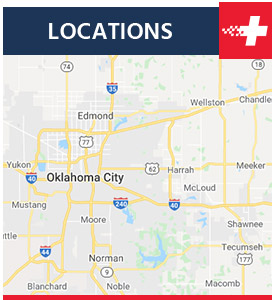Epigastric Pain Diagnosis and Treatment Specialist in Oklahoma City, OK
Occasional episodes of epigastric pain are usually not a major concern, but severe or persistent pain should prompt a visit to the doctor for evaluation. Let our team of healthcare professionals help keep your health in check today. Our physicians examine the underlying cause of epigastric discomfort and identify the most significant underlying conditions. Epigastric pain occurs in the center of the belly, directly below the ribs. Inflammation, infection, GERD, stomach bloating, and excessive gas are all causes of epigastric pain. For more information, contact us or schedule an appointment online. We have convenient locations to serve you in Oklahoma City, OK.


Table of Contents:
What does epigastric pain indicate?
What is the most common reason for experiencing epigastric pain?
How do you treat epigastric pain?
What is the fastest way to get relief from epigastric pain?
Epigastric pain, which is pain in the upper abdomen, can be indicative of various underlying conditions. It is commonly associated with factors such as overeating, consuming greasy or spicy foods, or drinking alcohol while eating.
Digestive issues may also lead to epigastric pain, including acid reflux, peptic ulcer disease, lactose intolerance, and in some cases gastroesophageal reflux disease (GERD) is a cause.
In some cases, epigastric pain may arise from inflammatory diseases or cancers affecting organs like the gallbladder, pancreas, first part of the small intestine, or stomach.
Epigastric pain could also signal a cardiovascular problem, such as a heart attack or angina. This pain might radiate to the back, shoulder, or arm, warranting immediate medical attention for proper evaluation and treatment. If you experience persistent or severe epigastric pain, seeking medical care promptly is crucial to identify the underlying cause and ensure appropriate management.
Epigastric pain, particularly after eating, is commonly associated with indigestion, often characterized by a burning sensation. This burning quality is typically linked to stomach acid produced during the process of digestion.
It may also be accompanied by conditions such as GERD and heartburn. When your body produces an excessive amount of acid or there’s an imbalance in its production, it can lead to irritation or burning of the stomach lining, resulting in epigastric pain.
In addition to the burning sensation, indigestion may manifest with frequent burping, a sensation of bloating, and occasional nausea. If you experience indigestion, it’s possible that you might be intolerant to certain foods you’ve consumed.
Keeping a food diary can help identify any patterns and determine if specific foods or food types are triggering episodes of epigastric pain after eating. By recognizing these triggers, you can make dietary adjustments to alleviate discomfort and manage the condition more effectively. If symptoms persist or worsen, seeking medical advice is recommended for a proper diagnosis and personalized treatment plan.
Epigastric pain treatment approaches vary depending on the underlying cause. Occasional episodes of epigastric pain are usually not a major concern, but severe or persistent pain should prompt a visit to the doctor for evaluation.
Persistent symptoms lasting more than a few days or occurring regularly more than twice a week warrant attention. For cases where overeating is a trigger, individuals may consider adjusting their eating habits, opting for smaller portions, and incorporating filling foods like lean proteins while avoiding gas-inducing foods.
Chronic conditions such as GERD, peptic ulcers, and Barrett’s esophagus may require long-term management. Collaborating with a healthcare professional is crucial to establish an effective treatment plan that suits the individual’s needs.
In instances where certain medications may be contributing to the condition, a doctor might suggest trying alternative drugs or adjusting dosages.
Over-the-counter or prescription antacids can be beneficial in reducing frequent acid reflux and managing epigastric pain caused by stomach acid. It’s essential to seek medical advice for proper diagnosis and personalized treatment, ensuring effective relief.
Seeking relief from epigastric pain can be achieved through various methods, but it’s important to note that the effectiveness of these approaches may vary depending on the underlying cause of the pain. While most abdominal pain resolves without specific treatment, there are home remedies that individuals can try to ease discomfort. However, it’s crucial to consult a doctor to determine the precise cause of the pain and receive appropriate medical advice.
Some home remedies that might provide relief include applying a hot water bottle or heated wheat bag to the abdomen, taking a warm bath, and staying well-hydrated by drinking clear fluids like water. Additionally, reducing the intake of coffee, tea, and alcohol, which can exacerbate the pain, and getting sufficient rest can be helpful. Over-the-counter antacids might assist in reducing certain types of epigastric pain caused by acidity.
Epigastric pain treatment is available at Immediate Care of Oklahoma. For more information, contact us or schedule an appointment online. We have convenient locations near you in Oklahoma City, OK. We serve patients from West Moore OK, Edmond OK, Yukon OK, I-240 & Sooner RD OK, Tecumseh OK, Norman (HealthPlex) OK, Norman (24th) OK, Bethany OK, and surrounding areas.


Additional Services You May Need
▸ Urgent Care Services
▸ Illness + Injuries
▸ On Site Lab + X-Ray
▸ Helpful Health
▸ Motor Vehicle Accidents
▸ Drug Testing
▸ MRO
▸ UTI Treatment
▸ Employment Physicals
▸ Workers Comp
▸ Strep Throat Treatment
▸ Pregnancy Testing
▸ Blood Pressure Testing
▸ Urinalysis
▸ Mononucleosis Treatment
▸ Suture Removal
▸ Respiratory Syncytial Virus
▸ OccMed








